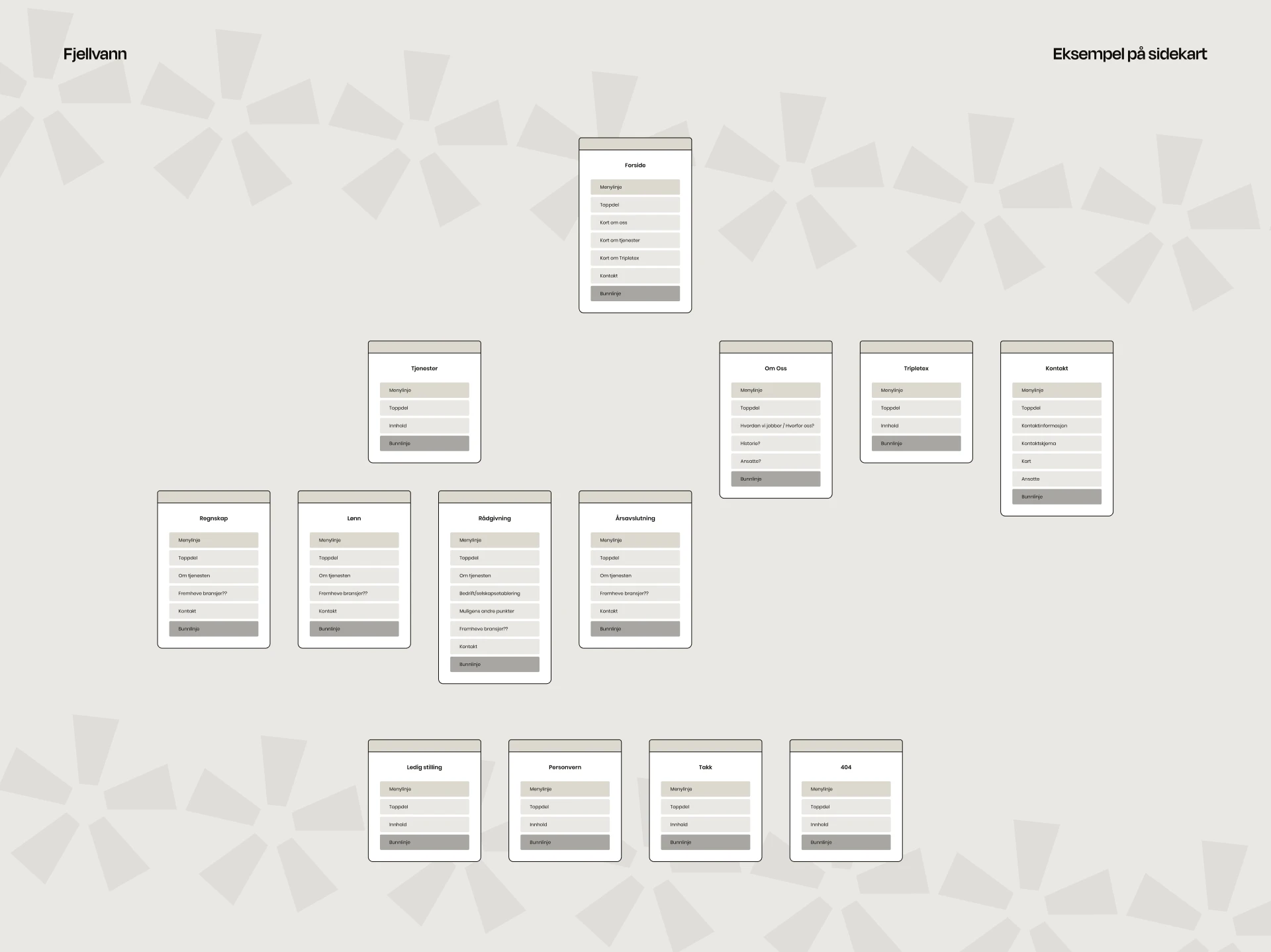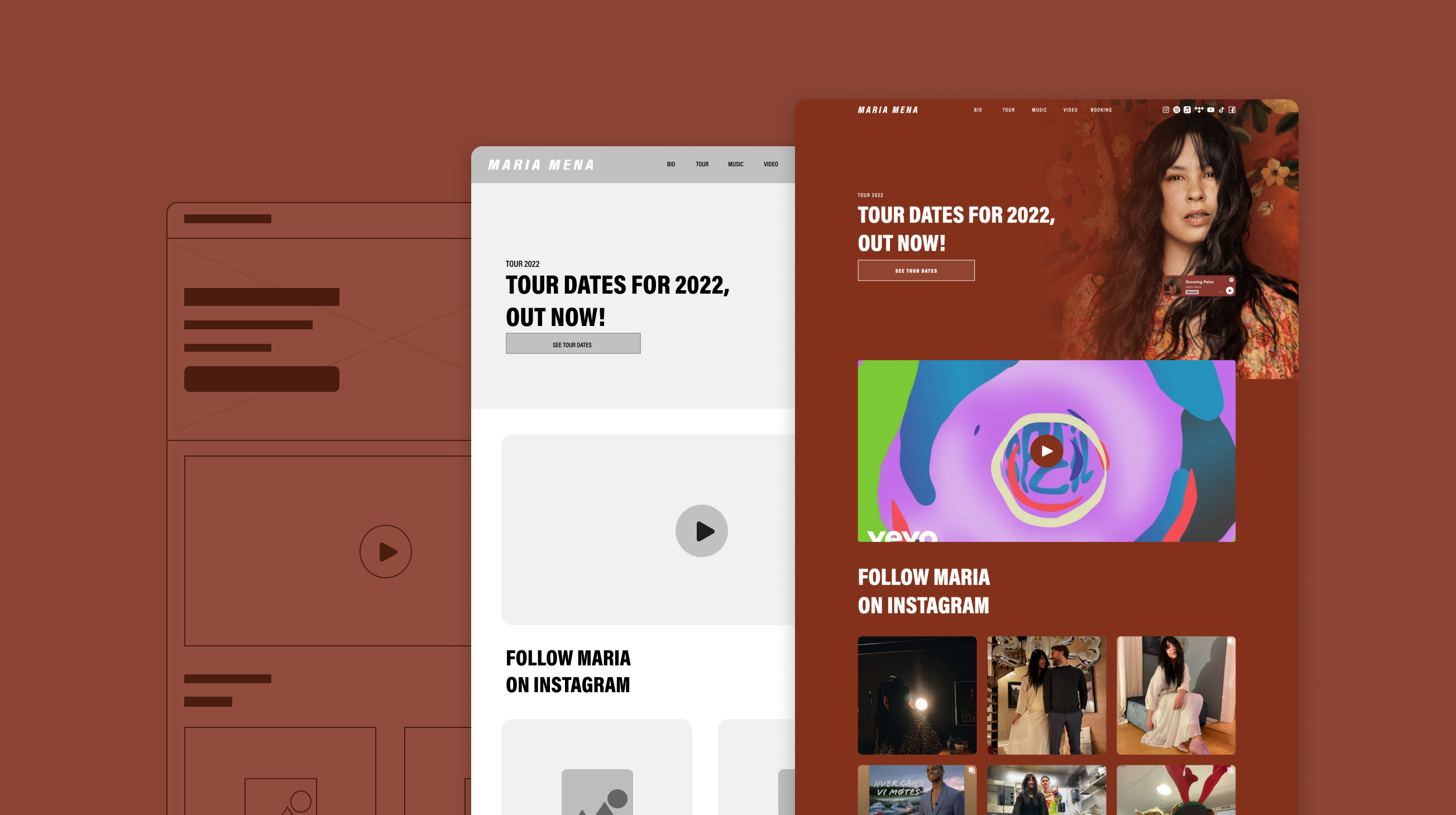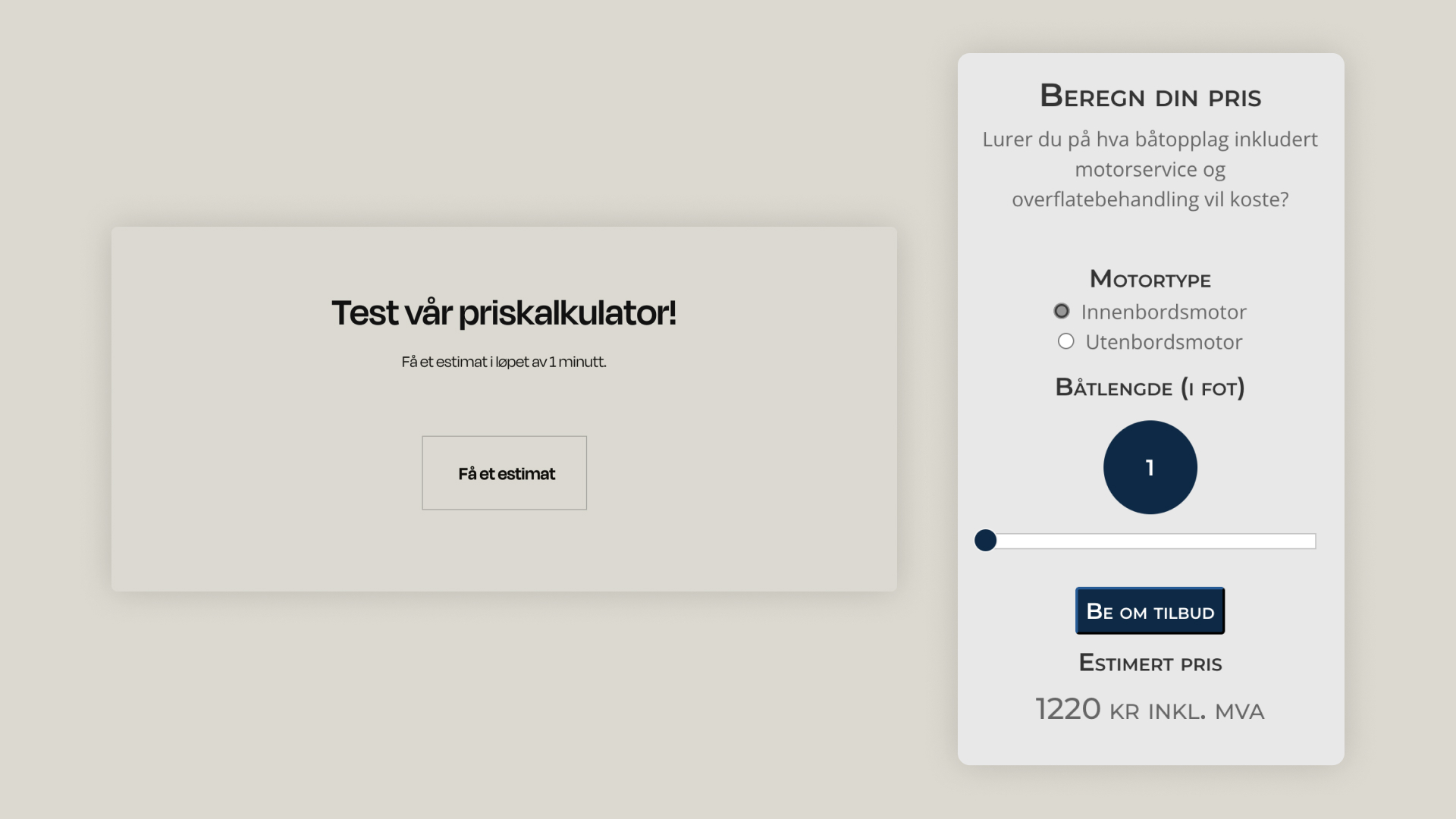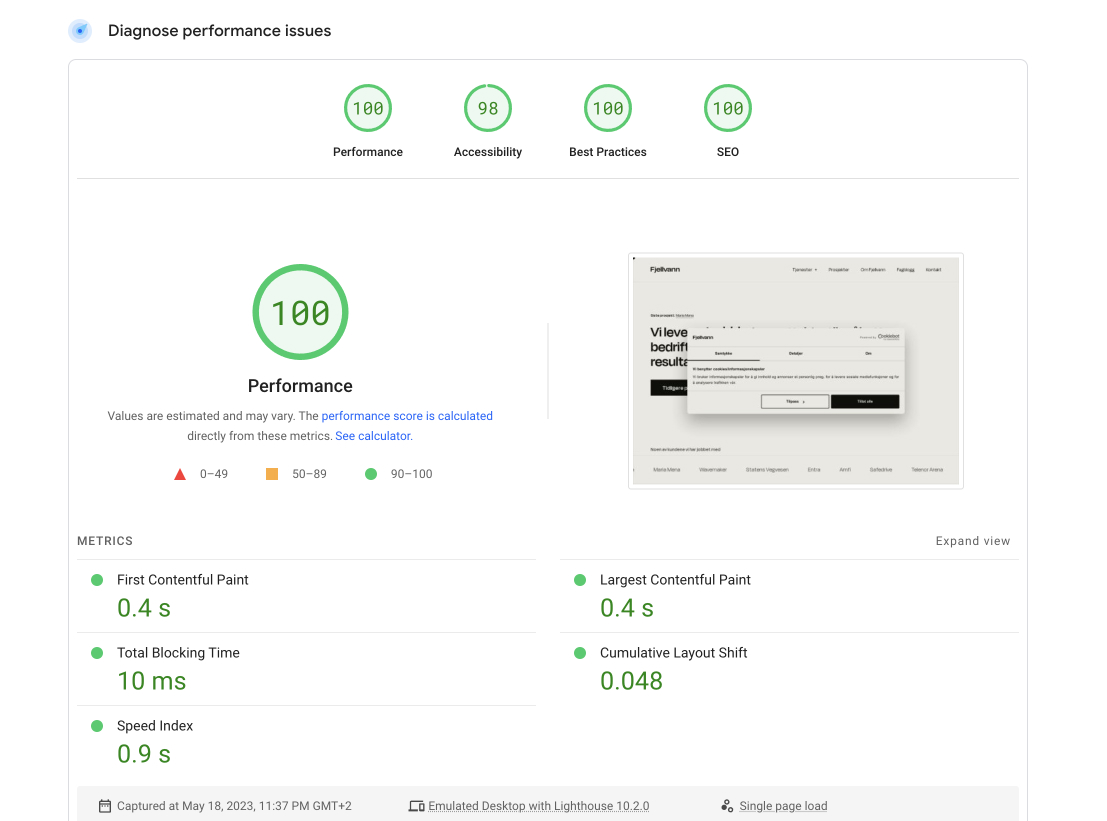What do you want to achieve?
The first thing we ask everyone who contacts us is: "What do you want to achieve with your website?" Without a good answer to this, what the website costs, does and looks like is completely irrelevant.
Many have a good picture and specific goals for what they want to achieve with the new website , while others need to go through a process internally or with a website agency to clarify what they want to achieve with the website.
If you need a workshop with an agency, this will obviously cost more, but my sincere, albeit unqualified opinion is that it will be a cost that is saved or recouped later in the project. This can happen through either more new customers or time savings, or both.
New website? 10 important points to consider!
What you should consider
To determine what you want to achieve, it's also a good idea to think about how you want to position yourself in the market and who you want to reach. Some of the points we always want to have gone through:
- Who are you? What makes you unique? This isn't just a phrase to tell us what you do, but the way you communicate. In short, the personality of your company.
- Definition and information about your brand(What is a brand?)
- The target group you want to reach.
- Specifically what problem(s) you solve for this target group.
- Some concrete numbers and measurable variables you want to improve. E.g. number of visits, leads, sales etc.
As a minimum, you can set a clear target figure and a defined target group. For example: To be contacted by 10 new potential customers from the website every month in the target group "Young entrepreneurs in Oslo."
Page structure - Create a map of the website
Page structure can have a significant impact on price, but not necessarily as much as you might think. A website with 5 subpages requires more work than a website with 50 subpages, and should therefore cost more.
But what about cases where 45 of these pages will use the same visual structure and thus only need to be created once, and only the content changes. Then it suddenly doesn't seem like much unless you're using a copywriter to write the text.
What you should consider
Draw up a site map for the website, this will help you to organize your thoughts, but also to be able to see how much work will actually be involved.
If the project is to be delivered in-house then this is an important process anyway, and if it's to be done by an agency then this will be a great help.
We recommend using a whiteboard/ipad or other media where it is easy to move things around and edit as you go. Post-its can also be a good solution. If you want a digital solution, you can use e.g. gloomaps.com, which is free with some limitations.

Design - What should the website look like?
Design is perhaps the most difficult part when it comes to answering the question of how much a website costs.
Design can be solved in several ways:
- You use a ready-made template that keeps the work to a minimum.
- You can start with a template and make it your own.
- You can let an agency decide based on what they think.
- You can set a time frame for the design, and the result is what is available when the time is up.
- You can get a designer to work from an existing design manual.
- You can have a longer process with an agency and a designer where you go back and forth based on the purpose and target audience. Remember, they are the ones who will be using the website.
Neither of these ways is wrong or right. It depends on how much you want to spend on buying a website or how much time you want to spend internally.
What you should consider
- Remember, it's not about how much you or the agency likes the site. It's about how well the target group, the people who will use the site, like it.
- Simple and user-friendly design should always be the focus. It's rare that "groundbreaking" design is what helps a company achieve its goal. To quote Rema1000: "Simple is often the best."

Remember that you can also use the calculator
If you don't want to spend time reading the article and then sit down in "geek mode" to come up with a reasonable figure, you can use the calculator to get an estimate "quickly and easily."
What about the content?
The content, the text in particular, on a website is often de-prioritized. The vast majority of us can write, and so we assume that this is something we should do ourselves.
You should consider having a copywriter write the text
Often we see that customers care about the images used, they often care about the visuals. Whereas the text they deliver is "thrown together" in 15 minutes.
Of course, it costs a few extra dollars, but it's worth it.
The fear is often that someone from the outside won't understand the company and that the message won't be personal. This is not true.
A good copywriter will understand both your business and your target audience to deliver a message and text that is accurate, selling and just a drop provocative. (Yep, that drop is important).
What about images and video?
This varies greatly from person to person. Some people are fantastic hobby photographers with a good smartphone while others, like me, should stick to using a high-quality photographer/videographer or stock photo.
At the end of the day, it's all about value for money. If you have the budget, it's almost never a bad idea to invest in a professional photographer, videographer or copywriter.
Functionality
When we talk about website price, it's impossible to get away from functionality.
What does a website without too much "mikk makk" cost?
Firstly, it's relative. A simple page with information can be delivered for 10,000 and 100,000, but there will always be differences even if the page is perceived as "quite similar." No one expects you to buy a website to know exactly what a function costs, but in short, you need to think about which functions you want and be prepared for some functions to cost more than others.
Example of simple "standard" features that you can expect on most websites
- Contact form(s).
- Integration with a map solution such as Google Maps.
- Mobile-friendly design and function.
- Linking to simple third-party solutions that have a "ready-made solution" for the platform on which you build your website. Examples of this are links to e.g. MailChimp for newsletters.
- Opportunities for blogging/articles.
- Ability to edit content yourself. This is standard and easy by using a publishing solution (CMS) that supports this, e.g. WordPress or Craft CMS.
Examples of features that may cost a little extra, but not necessarily a lot.
Everything with functionality is relative. A website price calculator like we use can be made much more advanced to get an even more specific result. But in the vast majority of cases, the current solution is sufficient. So you don't have to think that the features on this list are 100 000,- features. But they often require an add-on regardless of whether it's 5,000 or 50,000.
- Online store with multiple products and categories.
- Automation of processes.
- Advanced chatbot.
- Integrations with third-party systems that do not have a ready-made/simple solution. E.g. connection to large APIs.
- Quiz, Calculator or other interactive feature with some form of logic.
- Membership and login for customers.
Also remember that a website agency often needs good information to be able to put a price on a feature. They need to know the need and why the feature is important. Often we will then be able to come up with a better solution, and we may even have created something similar before.

Technology - Which platform?
The platform you choose for your website varies greatly based on what you need and also affects the cost of the website.
Fortunately, the differences are not too great, but there are five "categories" with many different types of platforms. We have listed some below.
Do it yourself solutions
From free to a few thousand dollars a year.
- Squarespace (Recommended)
- Wix
- WordPress.com (Not to be confused with WordPress.org)
Professional website solutions
These are solutions that are often used in conjunction with an agency, but technical people can also use them to do it themselves.
Here, you usually start at a minimum of 25,000,- ex VAT to work with an agency that can create a good website, but this often extends up to several hundred thousand in some cases.
Licenses and third-party costs may also be incurred.
- WordPress.org (Recommended for most people)
- Craft CMS
- Joomla
- Drupal
- Hubspot (Part of their solution is a website "module")
Read more about the pros and cons of using WordPress for business websites.
Online store solutions
Online stores are a separate branch of websites, especially when it comes to price. You can build simple "online stores" without too much work, but an online store requires a lot more work than a pure information page.
If you're not going to do it yourself, you should expect to start between 50,000 and 100,000, while the ceiling is closer to a million, unless you have greater needs. Then just start adding zeros.
- WooCommerce, combined with WordPress
- Magento (Recommended for larger)
- Shopify (Do it yourself, but can also be used with an agency)
- BigCommerce
Learning and course platforms
Learning platforms or course pages have become more and more common, especially after COVID-19. Fortunately, there are good solutions that can be used to make this easier than it has been in the past.
You can expect similar pricing as an online store in collaboration with an agency. 50,000 to 100,000 as a start and an "endless" ceiling if you need a lot more.
Several of these solutions are also available for those who want to do it themselves.
- Kajabi.com
- Teachable.com
- Thinkific.com
- LearnDash in combination with WordPress
Enterprise solutions
This is the most difficult market to predict, as it often involves many bespoke features, integrations, security measures and more.
- ContentStack
- WordPress VIP (Used by e.g. USA Today Sports, Capgemini and the New York Post.)
- TYPO3
- Neos
- Episerver
- Tailor-made solution
We recommend and create most of the websites we deliver in WordPress. The reason is that 35% of websites in 2020 use WordPress.
This means having a large network of developers who maintain the platform, keep it secure and create solutions that can be downloaded for free or purchased for a fraction of the development cost.
At the same time, it's a good platform that strikes a good balance between functionality and flexibility.
In conclusion... The vast majority of people reading this will be able to use WordPress and achieve their business goals online, but there are always exceptions.
What does website maintenance cost?
Running and maintaining a website is more important than it may sound. It can lead to more visitors and, in the worst case, have costly consequences.
Think of it as servicing and insuring your car.
There are some pitfalls if you don't take good care of your website:
- The website may become slow and thus less used.
- The website can be hacked and infected by spam or other "viruses."
- You can lose data because you don't have a good backup solution.
- Google may penalize the site for, for example, not keeping track of broken links or pages that no longer exist, or for having vulnerabilities on the site.
- Orders or inquiries don't go through because you don't test and make sure it works.
- Each company's website maintenance needs vary greatly. Some may have an automated plan, while others need a fully dedicated team to look after it 24/7.
The cost of running a website is also something to consider when calculating the cost of a website.
Examples of operation of website "levels":
- Simple manual - Under 1,000,- per year
You pay for a server and domain with a third party, but handle the technical aspects of the website itself. This requires some work and is something that needs to be done regularly.
Read more about running WordPress websites here. - Suitable for most people: Semi-automated with agency - Between 5,000 and 30,000 per year
Here you can use a professional website agency that has a process or system that handles everything for you as a customer. There are big differences in the quality and content of these solutions. Find something that suits your company's website. - Manual with agency - 60,000 or more per year
This is usually for websites that generate significant revenue for the company, and it is important that everything works properly. Marketing sites and online stores quickly stand out. Here, everything needs to be tested and updated regularly, either by an advanced system and/or a person. At this level, there are almost no limitations and again, it is important to know exactly what needs to be done for each individual site.

Marketing: What does it cost to get visitors to your website?
A website that no one visits is effectively worthless.
We're not going to run down a long list of options when it comes to marketing, or what's best for your business website.
The point is that you need to have a plan for how you intend to drive visitors to your website, and budget for this as an ongoing cost.
Some possibilities:
- Advertising on Google, Facebook, LinkedIn or other channels.
- Search engine optimization (Get found when someone searches for what you offer.)
- Content marketing
- Video marketing
- Social media
- Influencers
- PR/press
- Newsletters
- Various non-digital opportunities such as DM, fliers etc.
Who should you use - Choose the right website agency for you
I should probably open by saying that everyone must use Fjellvann, but I know very well that that's not true. There is no single agency that suits everyone. Which agency you should use depends on what you need, what budget you have, what industry you're in, what target group you need to reach or more fluid areas such as: does the way you work fit with the agency or freelancer you choose? Do you get along personality-wise?
There is no set formula here, but I recommend doing good research before choosing who to work with, open a dialog with several people, look at their previous work, see what they write, see what others write about them, maybe even take on a small project to see if you get along and the way they work fits your needs.
We have the idea that if we see that we're not right for a project, we'll pass you on to someone we think might be a better fit. I personally think it's absolutely terrible if I accept a project from a customer who wants something I can't deliver, or has expectations that don't fit the budget. Then I won't be able to satisfy the customer and it's much better for me and the customer that the project is delivered by someone else. I also say no to several projects because of this, so be prepared that the agency you want to use may not necessarily want to take on your project. If you do good research beforehand, you'll probably have already clarified this, but it can be good to keep in mind.
Also read: Why you should use a web designer.
Budget - What price are you willing to pay?
What should I spend on a website? What should the website cost? Sensitive questions for many companies, and the answers vary widely.
How much you should spend is simply a matter of what you want to achieve and whether it will be a positive investment. There may be other variables that mean you may not be able to afford to build the website you want, maybe now is not the right time or maybe you should wait for some of the features you want to build brick by brick.
"I often ask about budgets and very few people are clear about them. We have also been taught to give a supplier a budget because we think they want to squeeze as much money as possible out of you as a company. The thing is, we can deliver the "same" website for £25,000 and £100,000, the question is just how, what to build around, etc. One can be perfectly fine, while the other can be a super salesperson who drives sales for the company. So if we choose to be a little positive about the agencies, we choose to believe that they have the best intentions, it often helps to tell what you are willing to pay and the agency can adapt what they offer based on that. It should be noted that you shouldn't go in 100% naive and think that everyone is doing it, but this is why you should do thorough research before making a decision.
It's worth remembering that even if you get a website for £5,000, it can still be the most expensive purchase you ever make if it doesn't ensure you achieve what you want, while a £100,000 website can be a cheap purchase if it secures you millions in sales for several years. In the worst case, a bad website can be worse than no website at all. It should be noted that even if an agency charges £100,000 or more, this does not automatically mean that what you get is good.
Maybe all this is a bit much?
Not all projects require large budgets and long strategy phases. We have launched an offer for the simplest projects.
Together, we build a bespoke website in just one day.
Read more about budget-friendly website packages
What is your time perspective?
Time is money, and websites can take time to build. When does the site need to be online? When do you want it to be online? How long it takes to build a website depends on what you're building, capacity, staff and so on. But if you ask for a faster delivery than usual, you should also expect to pay a little more.
Most agencies have the option of moving projects around a bit, hiring extra help or similar to meet your deadline, but this costs the agency money and thus makes it more expensive. Talk openly and realistically about your time perspective and tell them that you are open to paying more if you can get it delivered faster if this is something that is really crucial.
Why not just build it yourself?
You've probably seen or heard about platforms where you can create your own website without being a web developer. I'll start by saying that this is rarely a good idea, but there are some cases where it's just as well.
When is it okay to build yourself:
- You're on such a low budget that you can't get someone good, but you have extra time.
This started as a list, but I realized very easily that this is the only case where it pays off. It's better to do it yourself if you can't afford to pay someone who is actually good at it.
Many of the customers who come to us have just created a new website with another agency or a freelancer where they paid virtually nothing, and thus got virtually nothing.
What can you do to keep the cost of a website down?
The first thing you can do is make sure you've read through this entire post and thought about each point, which will put you in a better position for a conversation with multiple suppliers.
Specifically, I would look at the following points:
- Have a clear specification of what you want.
- Set a concrete budget for what you are willing to spend.
- Outsourcing to countries with lower wages can pay off in some cases.
- Can you contribute something yourself without compromising quality? E.g. content.
- Can you use a template-based design?
- Give good and clear feedback on what you like and don't like
trust the advice of the agency you work with, even if you don't like something doesn't mean it's wrong. - Choose the agency that suits you and your business.
- Make sure to stay on the ball and give quick feedback when asked.
Summary
There are many points that affect the price of a good website that turns visitors into potential customers. The most important thing to remember is that you need to treat a website project as a "new build" and not a replacement of a door. Be careful in your assessment and focus on who meets your needs versus just price.
Try our price calculator!
Get an estimate within 1 minute.
Regular website
Online store
Blog / Magazine
Tailor-made
Template-based
Drag the cursor along the line to select the number of subpages/menu options.
We estimate that the website will cost:
Leave your name and email address and you will receive an email with your estimate within 1 minute.
Summary
| Description | Information | Number of | Price |
|---|---|---|---|
| Rejection: | |||
| Total: | |||

